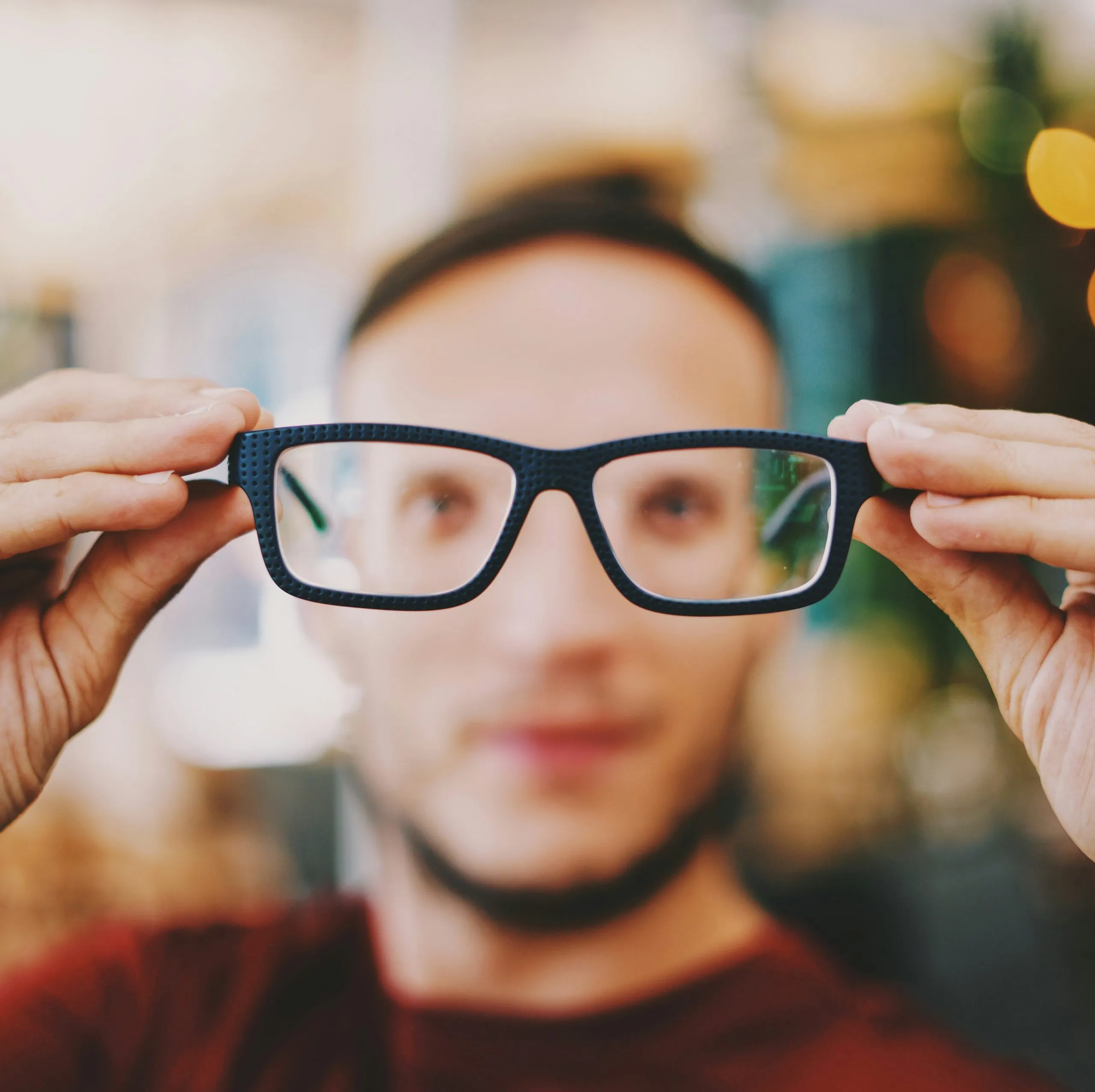It’s one of the most common concerns we hear: “Do glasses make your eyes worse?” Whether you’ve just been prescribed your first pair or you’ve been wearing glasses for years, it’s natural to wonder how they might affect your vision in the long term. You may even have heard people say that once you start wearing glasses, your eyes become “dependent” on them or that your vision deteriorates faster.
In this guide, we’ll tackle the myth head-on and explain what actually happens to your eyes when you start wearing prescription glasses. We’ll also look at the science behind vision correction and why understanding your prescription is key to maintaining healthy eyes over time.
What Happens to Your Vision When You Wear Glasses?
Let’s start by explaining what glasses actually do. Glasses correct refractive errors — which occur when light entering the eye doesn’t focus correctly on the retina. This results in blurred vision, either at a distance, up close, or both.
There are several types of refractive errors:
-
Myopia (short-sightedness) – difficulty seeing things far away
-
Hyperopia (long-sightedness) – trouble focusing on close-up objects
-
Astigmatism – blurry vision caused by an irregularly shaped cornea
-
Presbyopia – age-related difficulty focusing on near objects (usually after age 40)
Prescription lenses bend light to help it land correctly on your retina, allowing you to see clearly.
Wearing glasses doesn’t change the shape of your eyes — it simply compensates for how your eyes naturally focus light. So, wearing glasses doesn’t directly cause your vision to worsen.
Can Wearing Glasses Make Your Eyes Worse?
This is the big question — and the short answer is no. There is no scientific evidence that wearing glasses makes your vision deteriorate.
Wearing the correct prescription helps your eyes focus properly and can prevent symptoms such as:
-
Eye strain
-
Blurred vision
-
Headaches
-
Fatigue from reading or screen use
In fact, not wearing your glasses when needed can worsen eye strain and discomfort, particularly during close-up tasks or long hours at a computer.
What About “Eye Muscle Laziness”?
One of the common myths is that glasses “weaken your eye muscles” over time. However, the muscles in your eyes don’t work like biceps or triceps. Vision problems like myopia and hyperopia are due to the shape of the eye, not the strength of muscles.
Wearing glasses doesn’t make your eyes lazy — it helps your eyes work more efficiently by providing the correct focus. You may feel more reliant on your glasses over time, but this is usually because your eyes are no longer straining and you’ve become accustomed to seeing clearly.
Do Glasses Make You Dependent on Them?
Another common concern is becoming “dependent” on glasses. This sense of dependency is psychological, not physical. Once you get used to clear, comfortable vision, it’s normal to feel like you can’t go without your glasses.
That’s not because your eyes are getting weaker — it’s because your awareness of poor vision increases once you’ve experienced better clarity. If you take your glasses off after wearing them all day, the blur is more noticeable than before — not worse than before.
So, does wearing glasses make your eyes weaker? No — it makes you more aware of how blurry your uncorrected vision really is.
Ageing and Vision Changes: Natural vs Glasses
Vision changes as we age — particularly after 40 when presbyopia starts to affect near vision. This leads to an increased need for reading glasses, bifocals, or varifocals.
Some people wrongly attribute these changes to wearing glasses, when in reality:
-
Presbyopia is inevitable, whether you wear glasses or not
-
Myopia often progresses naturally during teenage years
-
Hyperopia and astigmatism can change slowly over time
Wearing glasses does not speed up these changes. In fact, regular eye tests and updated prescriptions help manage these shifts more effectively.
What If Your Prescription Gets Stronger?
It’s normal to feel concerned if your optician tells you that your prescription has increased. But a stronger prescription doesn’t mean your glasses caused it — it simply reflects changes in your eyes that would have happened regardless.
This is especially true for:
-
Children and teens – vision can change quickly as eyes grow
-
Adults over 40 – presbyopia is a normal part of ageing
-
People with certain health conditions like diabetes or eye injuries
The key is ensuring your prescription is always accurate, so you avoid the risks associated with uncorrected vision, such as squinting, headaches, and poor posture.
Vision with Glasses vs Without: Understanding the Difference
Let’s break this down:
Vision Without Glasses
If you have a prescription and go without glasses, you may:
-
Struggle to see clearly at specific distances
-
Develop eye strain from constant focusing
-
Experience headaches or visual fatigue
-
Find it harder to concentrate on tasks
Vision With Glasses
Wearing prescription glasses helps:
-
Sharpen vision at required distances (near, far, or both)
-
Reduce the workload on your eyes
-
Prevent squinting, posture problems, and fatigue
-
Make reading, driving, or screen use more comfortable
So, while some people may feel glasses “weaken” their vision, they actually restore your natural visual ability — not reduce it.
Should You Wear Glasses All the Time?
This depends on your prescription and how you use your eyes during the day. Your optician will usually tell you whether glasses are for full-time or part-time use.
For example:
-
Distance glasses (myopia): Often worn full-time for driving, walking, TV
-
Reading glasses (hyperopia or presbyopia): Worn only when reading or using a screen
-
Varifocals or bifocals: Designed for all-day wear with smooth transitions between distances
-
Occupational glasses: Specific to desk work or screen use, not for all-day wear
Wearing your glasses as recommended will give you the best vision and reduce the risk of eye strain or poor posture. It won’t cause your eyesight to worsen.
Wearing Glasses for the First Time: What to Expect
If you’ve just started wearing glasses, it’s common to experience:
-
Mild dizziness or visual distortion as your brain adjusts
-
A stronger sense of blur when removing glasses
-
Greater visual comfort during reading or driving
These effects usually settle within a few days. If problems persist, it may mean your prescription or frame fit needs adjusting. At Glasses Store, we offer free 90-day returns so you can shop worry-free.
Glasses for Children: A Special Note
When children are prescribed glasses, it’s essential they wear them as directed. Some parents worry that glasses will “trap” their child into long-term wear, but the opposite is true.
In young children, uncorrected vision problems can affect:
-
Visual development
-
Academic performance
-
Eye coordination
Early correction helps ensure the eyes and brain learn to work together properly. Not wearing glasses when needed can worsen the problem and delay development.
Myths About Wearing Glasses
Let’s clear up a few lingering myths:
Myth: Your eyes get worse once you start wearing glasses.
False — your awareness of blur increases, but glasses don’t cause deterioration.
Myth: Glasses weaken your eye muscles.
False — your eye muscles aren’t responsible for refractive errors like myopia or presbyopia.
Myth: You’ll become dependent on glasses.
False — you’ll notice blurry vision more once you’ve experienced clarity, but that’s not dependence.
Myth: Vision would stay the same if you didn’t wear glasses.
False — most vision changes happen naturally and are unrelated to wearing glasses.
Buying Glasses Online with the Right Prescription
If you’re concerned about vision changes, the best thing you can do is:
-
Get regular eye tests (at least every two years)
-
Wear glasses as prescribed
-
Keep your prescription up to date
At Glasses Store, we make it simple to order glasses online with full lens customisation:
-
Single vision, bifocal, varifocal, and reading lenses
-
Blue light, photochromic, and anti-reflection coatings
-
Occupational glasses for work and screen use
-
Over 500 styles in stock
-
Virtual try-on tool to help you pick the right frame
All glasses are made specific to your prescription and shipped with free delivery over £100, a 90-day return policy, and a 12-month warranty.
FAQs: Do Glasses Make Your Eyes Worse?
Do glasses make your eyes weaker over time?
No. They correct your vision, not change your eye structure.
Can wearing the wrong prescription make your vision worse?
Wearing an inaccurate prescription can cause eye strain or discomfort, but won’t permanently damage your eyes.
Should I wear my glasses all the time?
Follow your optician’s advice — some prescriptions are for all-day wear, others are for task-specific use.
Can children outgrow the need for glasses?
In some cases, yes — especially with hyperopia. But many will need ongoing correction as they grow.
Do I need to wear my glasses even if I feel fine without them?
Yes, if they’re prescribed for daily tasks like driving or screen use, wearing them prevents eye strain and keeps you comfortable.
Final Thoughts
So, does wearing glasses make your eyes worse?
No — quite the opposite. Glasses are designed to support your vision, not harm it. Any changes in your eyesight are usually due to natural ageing, growth, or lifestyle — not because of wearing corrective lenses.
Understanding how your glasses work, wearing them consistently as prescribed, and getting regular eye exams are the best ways to keep your vision in check. If you ever feel like your eyes are changing, it’s a sign to update your prescription — not to ditch your specs.
At Glasses Store, you’ll find prescription glasses, varifocals, reading glasses, and even office-specific lenses — all fully customisable and available online with expert UK-based support.





